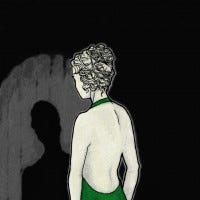Writer and designer Emily Short finds Heavy Rain's story "oddly paced and full of holes," and in this spoiler-heavy analysis, she analyzes where the narrative-driven game just doesn't succeed.

[Writer and designer Emily Short looks at where Quantic Dream's PlayStation 3 exclusive Heavy Rain's story and characters just don't measure up -- with significant story spoilers included as part of the analysis.] Plenty has already been written about Heavy Rain's defects as a game: the tiresomeness of the Quick Time Events, the fact that characters often walk back and forth in front of their own refrigerators in confusion, the inconsistent controls. All too often I felt like I was handling a character with a degenerative nerve disorder, nobly struggling with the quotidian trials of brushing teeth and drinking orange juice. Personally, though, I would have been happy to forgive Heavy Rain its defects as a game in deference to its strengths as story and interactive movie. The movie aspect does work brilliantly. The cinematic aspects are beautiful, the split screen moments much more effective than I would ever have expected, the graphics superb. It's too bad, then, that the story just isn't very good. Heavy Rain does daringly strike out from the range of genres that video games typically cover: instead of space warfare or car racing or fantasy heroism, we have a thriller about a serial killer. But there it draws on a large pool of existing cliches. The killer who cannot resist laying out puzzles for his victims' families. The heavily-foreshadowed car accident. The broken marriage. They're stock bits, and the fact that they come from the vocabulary of movies rather than the vocabulary of games does not make them any less predictable. The plot that results, moreover, depends on many characters acting against their own self-interest. It's oddly paced and full of holes. Predictable genre elements do not have to be a killer in games. I've seen the argument -- made fairly persuasively by several of the articles in Second Person, for instance -- that having a familiar genre to work with helps players of story-oriented games form a clear understanding of their range of action. But if the plot itself is not going to carry the work, it helps if there is something else going on to form the core of interest instead. In "Heavy Rain", that something else cannot be the gameplay; and, unfortunately, both theme and characterization fall short. To get into why, the rest of the discussion will have significant spoilers. I recommend not reading on unless you've already played through Heavy Rain. Problems of theme. At the core of this story there is supposed to be a thematic question. "How far," the game asks, "would you go to save someone you love?" It's a valid question, an interesting one. Other games have explored it occasionally. The ending of Fable II touches on it, though in a timid and ineffective way. Victor Gijsbers' Fate deals with it much more extensively. It is, moreover, the kind of question that can fruitfully be posed in an interactive context, because after each choice the player can be challenged with a new decision that refines on the previous one, pushed to refine the terms of his own morality. The problem is, the interactive aspects of Heavy Rain aren't mostly about this question at all. Norman and Madison are motivated more by curiosity and professional obligation than by love; Shelby bumbles through trying to find the right touchstones to get people to share their secrets with him. Where we do explore the question of love and sacrifice, the results are mixed. Yes, there are a handful of relevant trials set out for Ethan Mars to experience: the risky drive the wrong way down the freeway, the interminable suffering of getting through the broken-glass-and-electricity maze, the choice of whether to shoot the drug dealer. But these choices are desperately contrived. In real life, our choices are never so melodramatic, so ridiculous. Consequently, it's hard to take them seriously, even though they are supposedly contrived by a killer who has reason to be interested in the problem of paternal love. Moreover, though these sequences are narratively about choice, interactively they are framed as challenges. While story-Ethan may want to stick with the electricity maze and suffer through to the end, game-Ethan will quit if the player screws up the finger-Twister of Quick Time Events. What the protagonist would do is mapped against what the player can do, often to distancing effect. That's not to say that a gameplay challenge can never represent the protagonist's choice. I've written before about how challenge in some games is an effective way to measure the protagonist's devotion to a cause. Arguably the electricity-maze sequence, at least, is an appropriate place to use this kind of challenge. The problem is that challenge-as-measure-of-determination works best if the player is willing (and encouraged) to replay a scene over and over until it comes out right. Heavy Rain spends most of its time discouraging the player from approaching it in that mode. So while I did restart the electricity maze a couple of times in order to win, I felt like that was a jarring break from the way the game otherwise worked, rather than an effective use of interactivity to merge the protagonist's experience with the player's. In other places the disparity between player's challenge and protagonist's choice is even more problematic. I felt that story-Ethan would not be willing to shoot someone in cold blood -- that that was a bridge too far for him -- but the framing of the game forced me into a scene of visiting his potential victim's apartment and getting into an altercation with him. My failure at the QTE of the fight scene was then understood by the game as a decision not to take the man's life, but I would preferred to have expressed that decision earlier on, without ever going to the apartment at all. Problems of characterization. I took Heavy Rain at its word that even failures should be played through and should produce meaningful stories. So while I did start a few scenes over when I had made the wrong choice because I simply misunderstood the controls (e.g., Jayden shooting the crucifix-obsessed man in the face), I did not go back and replay the more challenge-oriented action sequences. Both Jayden and Madison were dead by the time I got to the final stages of the game, and Shaun never got rescued. When Madison and Jayden died, though, I didn't mind too much. I felt the strongest interest in Scott Shelby, who from the outset conveyed more personality than the others. Ethan, Madison, and Jayden all struck me as more or less blank slates. We get very little information about any of them other than their weaknesses, at the outset: we learn about Madison's insomnia and fear, Norman's addiction, Ethan's family tragedy, but little about their strengths, their likes, their social networks. (Possessing a magic evidence-finding glove does not count as a personality note.) Shelby alone gives much evidence of having pre-existing friends. Then there was the acting and visualization. Shelby's body language and face expressed a patient world-weariness, and his willingness to keep fighting in the face of his own handicaps -- asthma, weight, age, world-weariness -- made me sympathize with the guy. The interactivity supports that view. Shelby gets a more nuanced range of choices than the other characters. Where Ethan faces purely contrived serial-killer challenges and Madison has to puzzle over such doozies as "should I administer first aid to this severely wounded man?", Shelby gets to negotiate his way through a tense hold-up situation, empathize with grieving parents, patch up a suicidal woman and look after her baby. Though a few of his options are a bit plot-contrived (do you give the life-saving pills to the man who suddenly has a convenient heart attack?), for the most part they seem plausible. I replayed the sinking-car scene until he succeeded in rescuing Lauren (a wrong guess about the controls had me save only Shelby the first time around) because it seemed inconceivable to me that this character, the character I'd developed in tandem with the game's authors, would ever leave a woman to drown. He even gets the most expressive range of body-language actions, with scenes in which he can lean indifferently against a wall or sit sympathetically next to his interlocutor. Those options are sometimes open to other characters as well, but are most systematically implemented for Shelby. Shelby, in other words, is the most humane of the protagonists, and the one for whom I felt my choices were the most genuinely defining. I was okay with the other characters being killed off -- even arbitrarily, even senselessly -- if my favorite hero remained alive. If you've played the game, you know where this is going. The twist ending, the discovery that Shelby is the Origami Killer -- that felt like a betrayal. Not because it was unexpected, not because I'd been successfully gulled into caring about Shelby -- I could live with that, and movies play those tricks all the time -- but because that twist negated the meaning of every truly interesting choice I'd made in the game up to that point. All that time I thought I was at least getting to craft one character, I was being played. There are ways to make that work. I've played games before where it turned out that the protagonist was not the hero, or where the player's agency was much less than it originally appeared. But it doesn't work in Heavy Rain, where so much of the story and gameplay are built around the concept that choices do matter. I strongly agree with all the articles and reviews that call Heavy Rain a must-play for people interested in narrative games. I'm delighted it was made, and I'd happily play more games that attempted some of the same things. While I didn't always have fun, I was almost always interested, and the times when I was bored were the spots, such as that horrendous electrified maze, when it was most gamelike. I would like to play more works where every moment of the game was in some way contributing to the narrative, and while Heavy Rain occasionally falls short of that (especially during the dull, draggy prologue), it does a better job than the vast majority of commercial games out there. But I also feel that the real deficiency of Heavy Rain lies not in the limitations of its gameplay but in the nature of its story -- the cliches, the weak characterization, and, most of all, the makers' failure to recognize what would be interesting about making this particular story interactive. (Disclosure: I played a copy of this work that was purchased at full price. I have had no commercial affiliations with the publisher at the time of writing.) [Emily Short is an interactive fiction author and part of the team behind Inform 7, a language for IF creation. She also maintains a blog on interactive fiction and related topics. She also contracts for story and design work with game developers from time to time, and will disclose conflicts with story subjects if any exist. She can be reached at emshort AT mindspring DOT com.]
About the Author(s)
You May Also Like








